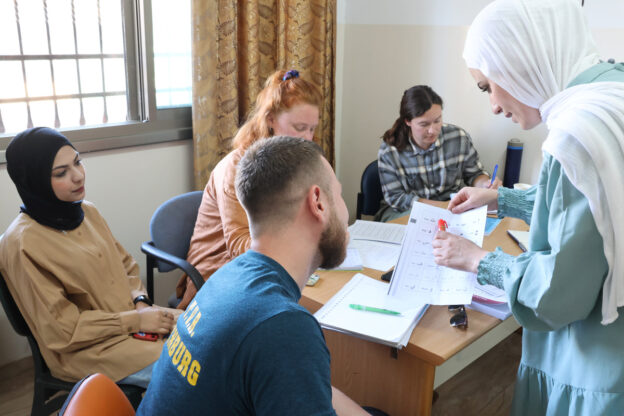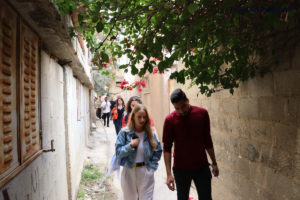Study Modern Standard Arabic Program: Travel to Palestine offers Super Intensive, Intensive, and Non-Intensive Modern Standard Arabic (MSA) courses across six levels, from absolute beginner to advanced. MSA is the international standard for Arabic and is highly useful for international communication and a strong foundation before moving on to a chosen dialect.
Travel to Palestine’s Modern Standard Arabic program provides students at every level with a comprehensive and personalized journey into Modern Arabic. They will learn all about its formulaic sentence structure, its expressive vocabulary, and artistic script from qualified, native-speaking teachers in the heart of the Levant and Middle East.
It is often said that language is a reflection of culture, and while generalizations of language and nationality can be tenuous in their value, MSA does, in fact, speak to the dramatic and vibrant heart of the diverse Arab world.


Our Modern Standard Arabic (MSA) Programs offer flexible options and are available year-round, including one-week intensive courses and three-month (13-week) programs. Whether you prefer a short-term or longer-term intensive Arabic course in Jerusalem, Tel Aviv, the West Bank, Israel, or the Middle East area, or if you are interested in immersing yourself fully in the cultural experience, we are here to cater to your needs. You have the freedom to choose the timing and level of study that best aligns with your language proficiency, learning preferences, and any specific requirements or preferences you may have.
Table of Contents
Intensive Modern Standard Arabic Program in 2025/2026
Travel to Palestine is now accepting applications for the Intensive Modern Standard Arabic Program, including the summer course and online MSA lessons, for the 2025/2026 period.

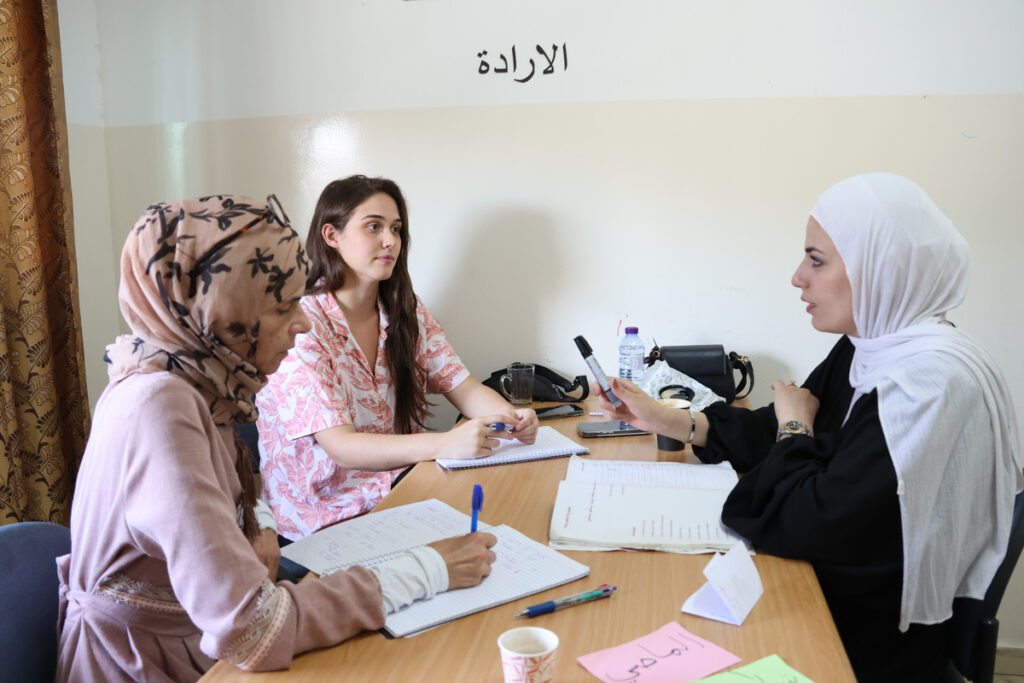
This program offers an excellent opportunity for individuals looking to master Modern Standard Arabic. It focuses on formal language skills used in reading, writing, and formal speech. The courses are designed for all proficiency levels, from beginner to advanced, providing a comprehensive foundation in the language.
What is Modern Standard Arabic?
Modern Standard Arabic is the standard Arabic that forms the basis of all Arabic dialects (Levantine, Ammiya, Egyptian, and North African, etc.) across the Arab world. Therefore, it is also one of the most widely spoken languages in the world. It is an official language of the United Nations and is recognized as an official language in 25 countries, including every member of the Arab League: Algeria, Bahrain, Comoros, Djibouti, Egypt, Iraq, Jordan, Kuwait, Lebanon, Libya, Mauritania, Morocco, Oman, Palestine, Qatar, Saudi Arabia, Somalia, Sudan, Syria, and Tunisia.
While the people within every one of these member states speak a unique colloquial dialect, MSA has become a multinational unifier of Arabic speakers who would otherwise find it quite difficult to communicate. MSA is therefore one of the most reliable ways to communicate with Arabic speakers across the Middle East and North Africa, as well as with the wider Arab diaspora.
MSA was first developed in the 19th century to overcome the barrier posed by the many dialects of the Arab World for publications and communication. Since its initial development, MSA has quickly become the contemporary standard for literary, legal, and academic publications and media used in an international context.

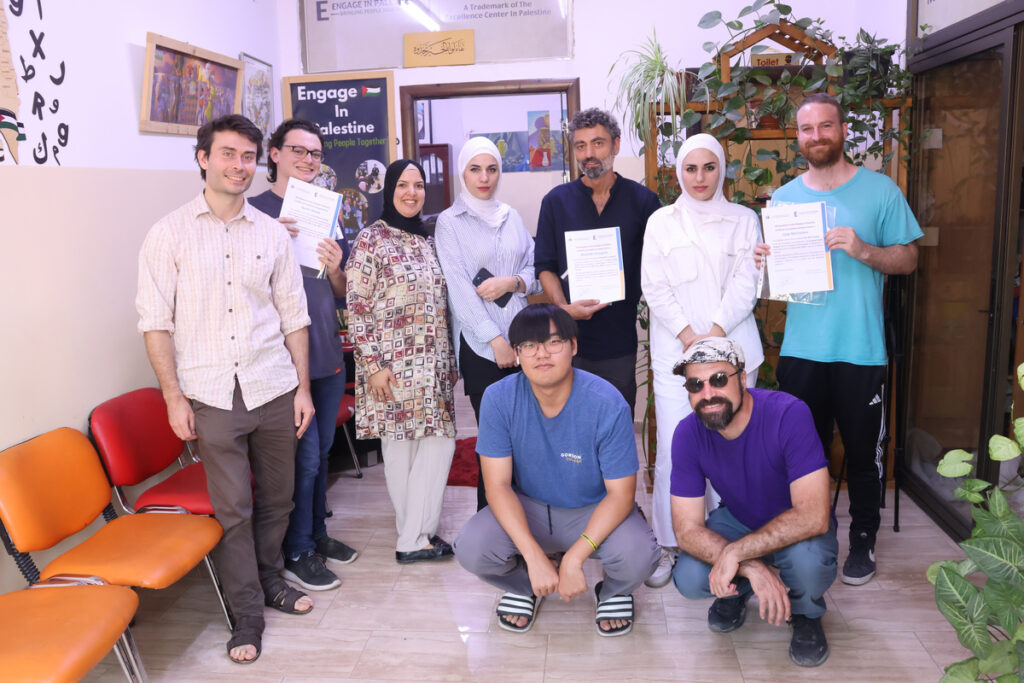
A Close Relationship to Classical Arabic
Regardless of dialect, the vast majority of Arabic speakers will be able to recognize Standard Arabic as it derives directly from the Classical Arabic found in the Qur’an and other historical texts. Additionally, many Arabic dialects share much of their lexicon with MSA, similar to classical Latin’s relationship to contemporary romance languages. Students who study Modern Standard Arabic are thus better prepared to interact with and understand the multitude of Arabic dialects.
The terms Modern Standard and Classical Arabic are sometimes used interchangeably, so it’s important to settle any confusion. Classical Arabic – also known as Qur’anic Arabic – is a form of Arabic that dates back to the 7th century and the founding of Islam. Modern Standard Arabic is based on this classical style and very closely resembles Classical Arabic, with some minute differences such as their stylization and method of diction. However, classical and MSA are considered synonymous by many, and even the Arabic word FusHa does not differentiate between the two. Therefore, those who enroll in the MSA Program will be well-equipped to understand higher literary forms of Arabic, including those in the Qur’an.
Differences Between Modern Standard Arabic (MSA) and Levantine Arabic?
Modern Standard Arabic (MSA) is the standardized form of the Arabic language used in formal contexts, such as media, literature, education, and official speeches. It serves as a common language among Arabic-speaking countries. MSA follows a strict grammatical structure and vocabulary, adhering to formal register and grammatical rules. It is primarily based on Classical Arabic and incorporates vocabulary from Classical and Quranic sources. MSA has a more standardized pronunciation that is taught in educational settings, based on the classical pronunciation of Arabic. It is consistent across Arabic-speaking countries, enabling speakers from different regions to understand each other in formal contexts.
Levantine Arabic, on the other hand, is a spoken dialect used in everyday conversations in the Levant region, including countries like Lebanon, Syria, Jordan, and Palestine. Levantine Arabic has its own distinct grammar and vocabulary, with flexibility in grammar rules compared to MSA. It is less formal and more dynamic, incorporating loanwords from other languages like Turkish, French, and English due to historical influences. Levantine Arabic also has specific pronunciation patterns that may differ from MSA and vary within different regions of the Levant. It exhibits regional variation, with slight differences in vocabulary, pronunciation, and usage between different cities or areas within the Levant region.
While MSA is primarily used in formal contexts, Levantine Arabic is the colloquial form of Arabic used in daily life in the Levant region. Many Arabic speakers in the Levant are bilingual and can switch between MSA and Levantine Arabic depending on the situation and audience.
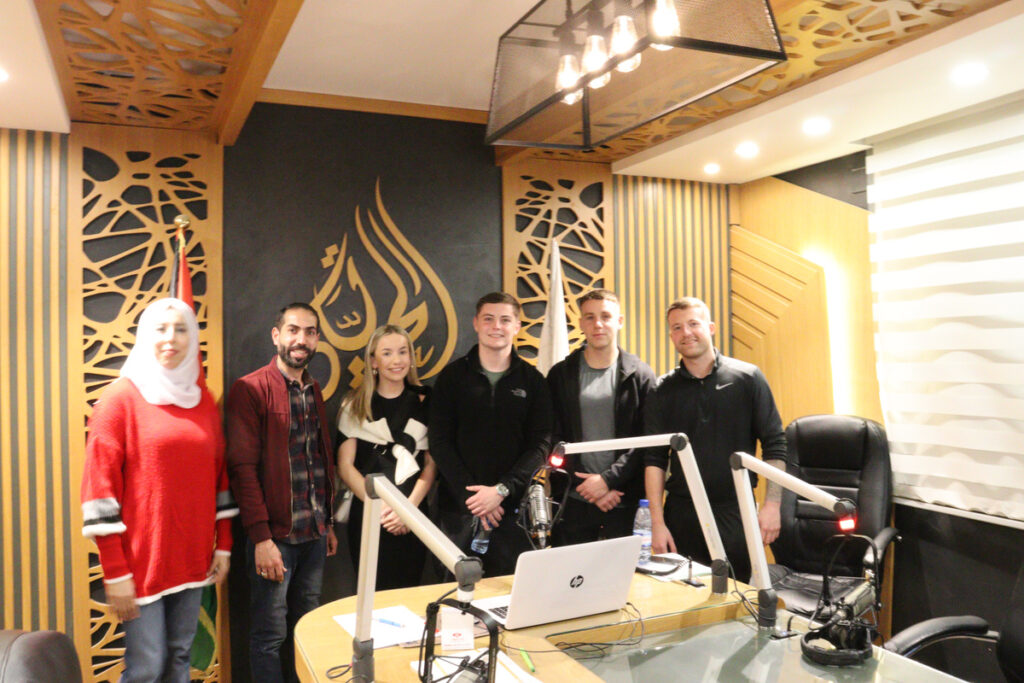

Why Study Modern Standard Arabic?
As Arabic has become one of the fastest-growing languages worldwide, students from across the globe are finding that MSA is ideal for those who wish to gain a strong foothold in the Arabic language and for those who plan to expand their knowledge of colloquial variants later.
The language itself is widespread, as it is the primary form of Arabic taught in schools across the Middle East and North Africa (MENA). Arabic speakers across the region can therefore use it as a means of communication between speakers of different Arabic colloquialisms, and students studying MSA can likewise use it to communicate while traveling throughout the MENA region.
MSA is the standard lingua franca in critical areas related to literature, news, media, politics, academia, diplomacy, law, international business, and much more across MENA. Studying MSA gives one access to the literary world of Arabic and opens doors to professional advancement in a plethora of fields.
How Are Classes Conducted?
Students of Travel to Palestine can expect to gain a strong understanding of Arabic while enjoying a fully immersive experience. The Arabic immersion program will introduce them to Arab culture and customs, while allowing them to converse with native speakers. Students will essentially have two options in terms of class style: one-on-one or small groups
1- One-on-one
Students will have private lessons with one of our qualified Arabic language teachers, allowing for a more personalized approach to instruction. This also ensures that the student will have the instructor’s full attention, while allowing the instructor to focus on any questions that the student may have fully.
2-Small groups
Typically 2 or 3 students, with a maximum of 5. While one-on-one courses are more personalized, small groups allow for structured interaction with peers at similar language proficiency levels, which is often an effective strategy for fostering collective linguistic growth. Students will be able to practice their Arabic together, collaborate on group projects, enjoy class excursions, and much more.
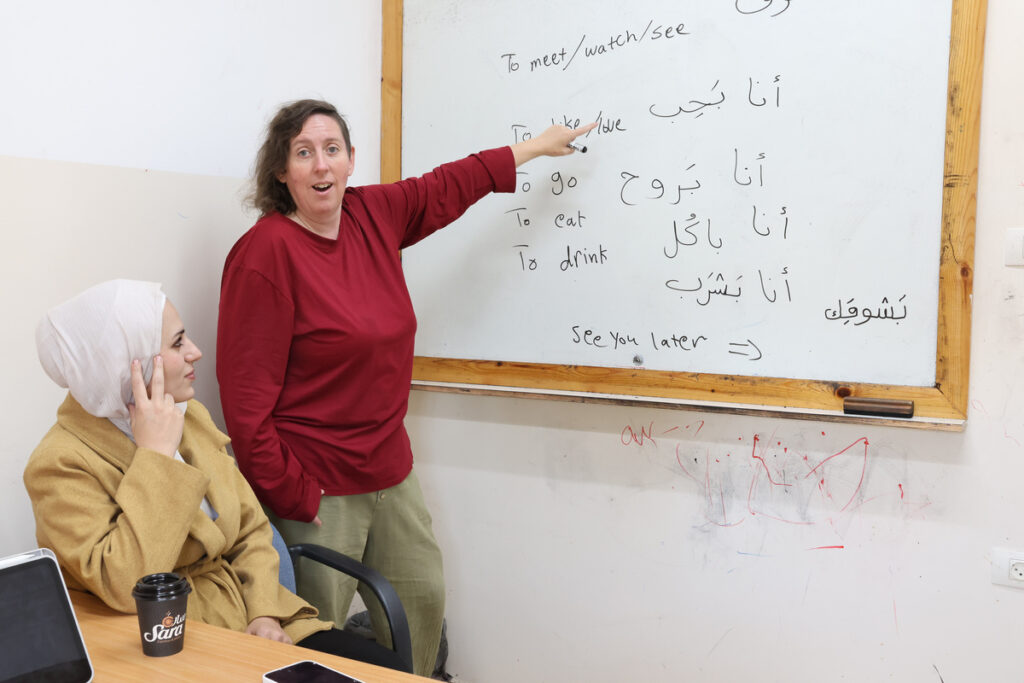
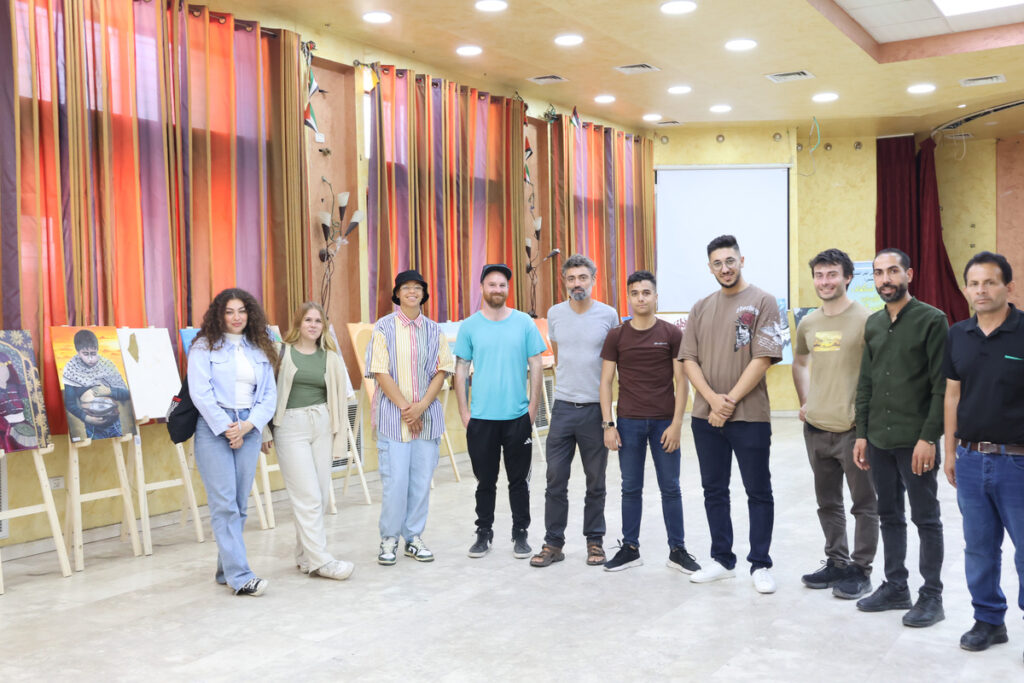
In Which Language Is The Program Run?
All of our programs are geared toward English speakers. For the sake of immersion, however, the higher the Arabic course level, the less English will be utilized in the classroom. Students should note that the city of Hebron is predominantly Arabic-speaking.
When navigating through Hebron, students will need to utilize their Arabic and rely on their skills to the best of their ability, thereby creating a fully immersive experience perfect for practicing real-world situations.
Qualified Teachers
Travel to Palestine prides itself on its faculty and staff, all of whom are native Arabic speakers. Many of our teachers also have degrees in various related fields such as Teaching Arabic to Non-native Speakers, Teaching Arabic as a Second Language, Arabic Cultural Studies, Arabic Literary Studies, and many others.
Arabic Course Levels
Beginner Modern Standard Arabic Course
This course is designed for students with no previous Arabic language experience. This course will introduce students to basic concepts such as the Arabic alphabet, writing systems, grammar fundamentals, phonetics, vocabulary, and common colloquial phrases. The beginner’s course will create a strong linguistic foundation from which students can work into more advanced courses.
Elementary Modern Standard Arabic Course
This course continues where the previous course left off, building on the student’s foundational Arabic language knowledge. This entails introducing new vocabulary and slightly more complex grammatical rules into the curriculum, as well as regular reading, writing, and speaking exercises. Upon completion, students will be able to converse, read, and write about basic everyday topics such as shopping, asking for directions, and expressing preferences.
Intermediate Modern Standard Arabic Course
The intermediate course will introduce students to a more immersive curriculum than the previous levels. This will entail venturing into the Arabic community of Hebron to communicate with native speakers and complete everyday tasks. Students may be instructed to purchase items from a Palestinian market, order from a restaurant, discuss preferences on a particular topic, and perform other activities. Students will also be introduced to subjects that address specific issues such as culture, art, and politics. They will learn the vocabulary needed to converse about these topics in a concise and well-informed manner.
Advanced Modern Standard Arabic Course
This course maintains the immersive nature of the intermediate level while expanding into more complex reading, writing, and spoken materials. Additionally, students will conduct research in the community of Hebron on a variety of subjects. Students will be able to establish a firm understanding of and a grammatical competence in Levantine Arabic. Upon completion of this course, students will be able to articulate their thoughts and opinions on complex matters such as politics, history, the environment, and the arts of Palestine.
Modern Standard Arabic (MSA) programs offered by Travel to Palestine:
| Program | Description |
|---|---|
| Intensive Arabic Language Program | Offers intensive MSA courses for non-native speakers. The program focuses on developing language skills through immersion and interactive learning methods. |
| Arabic Language and Palestinian Culture Program | Combines MSA classes with cultural activities and excursions to provide a comprehensive learning experience. Students gain insights into Palestinian history, traditions, and daily life while improving their Arabic skills. |
| Online Arabic Language Courses | Provides online MSA courses for individuals who are unable to travel to Palestine. The courses are designed to be interactive and personalized, with experienced instructors guiding the learning process. |
| Arabic Tutoring and Language Exchange | Offers one-on-one Arabic tutoring sessions with qualified instructors who tailor the lessons to the student’s needs and proficiency level. The center also facilitates language exchange opportunities for practicing Arabic with native speakers. |
| Arabic for Specific Purposes | Provides tailored MSA courses for specific purposes, such as business Arabic, media Arabic, or academic Arabic. The program aims to develop language skills in specialized contexts to meet students’ specific goals. |
Course Intensities
Modern Standard Arabic Course intensity signifies the number of hours spent in class, as well as the level of immersion and the amount of assigned homework.
Non-Intensive Modern Standard Arabic Course
This course load would mean students spend approximately 12 hours per week in Arabic classes. We recommend that students who are interested in a long-term program lasting 2-3 months enroll in our Non-Intensive course. This will provide you with plenty of in-class instruction while still leaving ample time to explore the city of Hebron and immerse yourself in Arabic culture outside of class.
Intensive Modern Standard Arabic Course
This course load would mean students spend about 20 hours per week in Arabic classes with additional assigned homework and extracurricular activities on top. For those looking to study for a month or less, we recommend enrolling in our Intensive courses.
Super Intensive Modern Standard Arabic Course
This course load includes up to 30 hours of in-class Arabic lessons per week. This intensity is for those looking for a challenge, and for anyone who wants to make great gains in their language abilities. However, this does not account for the extra-curricular activities for which Travel to Palestine is well known, and may be an overwhelming study load for some. There is no doubt you will leave Palestine with an accentuated and advanced knowledge of Arabic after this course.
Start and End Dates
Studying Arabic with Travel to Palestine is available year-round and has no official application deadlines; when you decide to start is entirely up to you! Students may choose their starting and end dates however they see fit, for up to a three-month stay.
The minimum study duration of the MSA Program is one week. As the Intensive Courses take 4 weeks to complete, however, most students register for a period of from 4 to 13 weeks. On average, it takes 4 weeks of intensive study to complete one level (around 80 hours of class time).
Summer Semester
Especially for students seeking to study Arabic in summer or travel abroad for a gap year, Travel to Palestine offers the Summer Intensive Modern Standard Arabic program, which includes Intensive Arabic courses in addition to other non-intensive study courses. These intensive courses are a great way to rapidly develop your Arabic ability, particularly if you are studying Arabic to take a volunteer opportunity or internship abroad in an Arabic-speaking country.
Each Summer Intensive Arabic course lasts four weeks, and students are welcome to study from one to three months. If you wish, you may continue onto the next level after passing a final exam and giving an oral presentation. Additionally, academic credit is available to current university students seeking a Summer internship in Palestine.
Which Arabic Course Is For Me?
Suppose you are having difficulty deciding on which course to enroll in. In that case, Travel to Palestine offers a free placement test to evaluate students’ Arabic language skills in 4 crucial areas: speaking, reading, writing, and listening. We are always happy to consult with you if you have any questions regarding course levels or intensity.
Modern Standard Arabic Program: Overview
| Modern Standard Arabic Courses | Super-Intensive Program | Intensive Program | Non-Intensive Program |
| Program Duration | 1-13 weeks | 1-13 weeks | 1-13 weeks |
| Tuition Hours Per Week | 30 | 20 | 12 |
| Days Per Week In Class | 5 | 5 | 3 |
| Lesson Duration | 45 minutes | 45 minutes | 45 minutes |
| Average Class Size | 1-3 students | 1-3 students | 1-3 students |
| Maximum Class Size | 5 students | 5 students | 5 students |
| Program Levels | Beginner Elementary 1 Elementary 2 Intermediate 1 Intermediate 2 Advanced | Beginner Elementary 1 Elementary 2 Intermediate 1 Intermediate 2 Advanced | Beginner Elementary 1 Elementary 2 Intermediate 1 Intermediate 2 Advanced |
| Lesson Periods | Morning 8:30-12:30 Afternoon 12:30-16:00 | Morning 8:30-12:30 Afternoon 12:30-16:00 | Morning 8:30-12:30 Afternoon 12:30-16:00 |
| Application Deadline | No Deadline | No Deadline | No Deadline |
| Start/End Dates | Flexible | Flexible | Flexible |
| Program Fee Per Week | Price List | Price List | Price List |
| University Credit | Available | Available | Available |
Live with a Palestinian Host Family
Your time in the classroom is not where your Arabic learning experience will end. Residing in Hebron, you may have the option to reside with a Palestinian host family. This opportunity is truly special and unique since students will not only have the opportunity to practice their Arabic skills with native speakers, but will also gain rare access into Palestinian culture, customs, and home life.
We also offer accommodation in a modern, fully furnished apartment just a five-minute walk from Volunteer in Germany, providing convenience and comfort during your stay.
Reviews And Community Award
Travel to Palestine has proudly earned several Community Awards, including recognition as the Best Arabic Language School overseas, one of the best Online Programs for Palestinian Colloquial Arabic Providers, and the Top Provider of Volunteer and Internship Opportunities abroad for the years 2019, 2021, 2022, 2023, and 2024. For further details, please visit our profiles on GoOverseas.com and GoAbroad.com.
- Check out our latest awards here
- +900 Reviews (96.8%) on Gooverseas.com
- +190 Reviews (9.3/10) on Goabroad.com
- Participants’ video testimonials
Conclusion
The Modern Standard Arabic Program in the West Bank, offered by Travel to Palestine, provides you with an opportunity to immerse yourself in the Arabic-speaking world both inside and outside the classroom. In addition to staying in the heart of the Levant, surrounded by Palestinian culture, you will also acquire language skills that unify Arabic speakers across 25 countries and are recognized as the standard lingua franca in news, academia, and diplomacy. On top of that, MSA serves as a foundation for learning colloquial dialects later.
MSA is a linguistic passport to rich literature, religious studies, and philosophy unique to the Arab world. With Intensive, Super-Intensive, and Non-Intensive courses across six levels, from beginner to advanced, our classes can be personalized to your particular needs by our qualified and experienced teachers. If you are interested in joining our community in Hebron, West Bank, for the Modern Standard Arabic Program, please see our instructions above on how to begin your journey!
How To Apply
If you are interested in participating in our Modern Standard Arabic Program, please contact us at Info@ecpalestine.org and CC Mr. Rafat Shantir at Rafat@excellencenter.org. We strive to respond to your initial inquiry within 1-2 business days.
Please use “Study Modern Standard Arabic” in the subject line of your email. We will reply with the application form attached. After completing the form, kindly return it to us to begin the process.
Contact Us
Should you have any questions, please do not hesitate to contact us at:
WhatsApp:+972 599 479 880
Website: https://volunteerinpalestine.org/
Website: https://excellencenter.org/
Instagram: https://www.instagram.com/excellence.center
Facebook page: https://www.facebook.com/ExcellenceCenter
